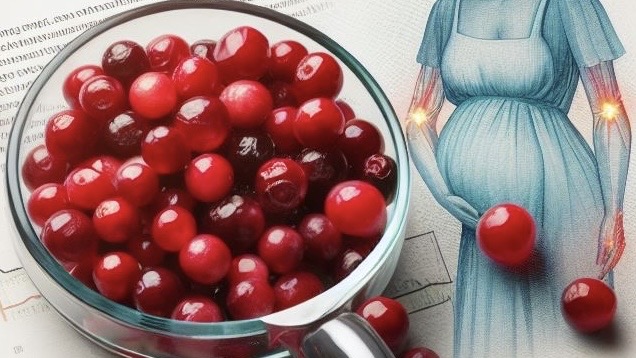Cranberries for Urinary Infections
No evidence cranberry juice is helpful for urinary infections in pregnancy, multiple studies find.
There is a mild preventative effect among children and non-pregnant women with recurrent UTIs – but those findings are still provisional.

The Facts:
Contrary to folk wisdom, many top Google results, including the prestigious-sounding Medical News Today, and the now ubiquitous opinions of ChatGPT, there’s no good evidence that cranberry juice does anything to treat urinary tract infections. That’s the conclusion reached by a high-quality evidence review first published back in 1998 and last updated in December 2023. Neither the old nor the updated version found any trials.
However, another review, focused on prevention, rather than treatment, did find tons of evidence. Back in 2012, it found no preventive effect despite the findings of 24 trials with over 4,400 participants. The updated version from November 2023 was able to detect a small reduction in urinary tract infection (UTI) rates after the data from another 26 trials were added – but, we probably shouldn’t get too excited just yet.
When subgroup analyses were performed, reduced UTI rates were found among women with recurrent UTIs and among children but were not confirmed among elderly inpatients, patients with urinary leakage, and pregnant women. Given an estimated 16% of pregnant women suffer from UTIs (or 20 million people at any given time), this is a disappointing result. Interviews of women who had UTI in pregnancy showed that this health condition is no minor concern to them; it aches, and the fear of serious harms to the baby is common. The need to take antibiotics worsens the fear and makes them consider other therapy options, such as cranberry pills.
The Evidence:
- A reputable Cochrane meta-analysis published in 1998 and updated in December 2023 found no trials of cranberry products being used for treating UTIs.
- Another Cochrane meta-analysis, updated in November 2023, focused on prevention and found a small reduction in UTI rates in those who consumed cranberry juice or cranberry products compared to those who took placebo, water, or no specific prescription.
- The certainty of evidence of the preventive effect is moderate, meaning that the estimate of effect might change in the future when new trials are published. This already happened with the 2023 update when it managed to detect the preventive effect of cranberry products, after the original 2012 review, encompassing half as many trials, failed to detect it with moderate certainty.
- The evidence is controversial to date for elderly inpatients, patients with urinary leakage, and pregnant women, as there were fewer trials that studied these subgroups.
- The lack of preventive effectiveness among pregnant women is important as they suffer from UTIs at a high rate and with additional severity, as studies of women’s lived experience detail.
Top hits on Google are ignorant of important evidence.
Running a Google search for cranberry + UTIs produces top results, including:
- Medical News Today, in their 2016 article, failed to account for the reputable Cochrane review, which, at that time, showed no evidence of preventive effectiveness of cranberry products. By contrast, the article cherry-picked just one trial (out of at least 24 known at the time) and suggested that cranberry capsules “reduce the prevalence of UTI.” This is despite their claims of having “strict sourcing guidelines.”
- HealthEssentials Cleveland Clinic also failed to acknowledge the Cochrane review in their post on cranberries, published in 2020, claiming, “One 2013 analysis of 13 different trials concluded that cranberry juice and tablets did reduce the occurrence of UTIs compared to placebo in women with recurrent UTIs. But another review found that they didn’t.” Neither reference led to the major Cochrane review. The outlet ended up turning to a doctor who suggested, “Cranberry won’t hurt, but it may help,” ignoring scientific evidence whatsoever.
ChatGPT is unaware of the evidence.
ChatGPT, asked if cranberries were “effective against urinary tract infections,” told us they are “believed” to have an active compound, proanthocyanidins, but “the evidence regarding the effectiveness of cranberries in preventing or treating UTIs is mixed.” Without actually showing the evidence and discussing its nuance, this is nothing more than a bland statement.
When science is done right…
During the research for this article, two systematic reviews were encountered, published in the same year, conducted by different teams (one from Australia and the other from the US), both of which settled on the same three studies as their core evidence base. This is a demonstration of the unique feature of scientific data and processes – the relative independence from the observer. They didn’t have to coordinate their findings; the scientific methodology did that for them.
As to the conclusion they concurrently came to, it’s that there are only several randomized trials on the use of cranberry products in pregnant women, and they did not show any reduction in urinary infection rates. Most trials are of poor quality, so odds are the conclusions might change if, theoretically, better studies are conducted in the future. What they did find was high dropout rates (at 30–50%), and the women reported intolerance of the high dosages of cranberry juice they were prescribed. The replacement of juice with pills helped a bit, but the dropout rates were still high – indicating that whatever benefits there may have been were accompanied by inconvenience.
The Research:
Notes
- This post was created by a team of researchers and journalists with the help of multiple generative AI tools. Please refer to the video bibliography for more information.
- Full changelog of this page is available.
- The original Zheln methodology is available as a preprint.
- Follow Zheln on Threads, Instagram, Twitter, or email me about anything.
- Donations are accepted via GitHub Sponsors.
Citation
Zhelnov P. Cranberries for Urinary Infections. Zheln. 2024 Jan 4;51(2):t5e3. URI: https://zheln.com/thread/2024/01/04/2/
| « Previous Post | Next Post » |
Let me know what you think of this article on Twitter @drzhelnov!